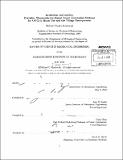| dc.contributor.advisor | Amy B. Smith and Gang Chen. | en_US |
| dc.contributor.author | Kozlowski, Michael C. (Michael Charles) | en_US |
| dc.contributor.other | Massachusetts Institute of Technology. Dept. of Mechanical Engineering. | en_US |
| dc.date.accessioned | 2012-12-13T19:19:17Z | |
| dc.date.available | 2012-12-13T19:19:17Z | |
| dc.date.issued | 2010 | en_US |
| dc.identifier.uri | http://hdl.handle.net/1721.1/75712 | |
| dc.description | Thesis (S.M.)--Massachusetts Institute of Technology, Dept. of Mechanical Engineering, June 2010. | en_US |
| dc.description | "May 2010." Cataloged from PDF version of thesis. | en_US |
| dc.description | Includes bibliographical references (p. 66-70). | en_US |
| dc.description.abstract | There are 1.6 billion people across the globe who still live without access to electricity. For this group, the modern electrical framework providing fundamental services for health, food and water processing and storage, sanitation, and communication is often out of reach. As a result, many suffer negative health, social, and economic consequences. In response, many have spurred electrification initiatives using conventional and renewable energy technologies as well as market-based approaches. However, few have considered thermoelectric technology in this context despite its capacity for long-lasting, solid-state electricity production directly from heat energy. The current work investigates such application for small-scale, off-grid power generation. Several systems were prototyped that are capable of generating electricity as a by-product of cooking. Kettlectric was the first developed and is based on a kettle design. It can produce 1.8 watts of peak power (Wp) and is compatible with off-the-shelf mobile rechargers and LED task lights by using a battery intermediate. After field study in Tanzanian, two additional myGen systems were constructed using separate manufacturing techniques. As pot retro-fits, they are adaptable to almost every observed cooking environment. Unlike Kettlectric, which boils water for a specific end-use, the myGen systems are single-function units that do not interfere with cooking habits. Each is capable of about 2 Wp of output and could potentially be scaled-up to provide income generation. The Kettlectric and myGen prototypes demonstrate functionality for small-scale, off-grid power generation systems, but successful dissemination is contingent upon significant decreases in thermoelectric module cost. However, reduced prices are expected in the coming years as demand for these devices increases. | en_US |
| dc.description.statementofresponsibility | by Michael Charles Kozlowski. | en_US |
| dc.format.extent | 70 p. | en_US |
| dc.language.iso | eng | en_US |
| dc.publisher | Massachusetts Institute of Technology | en_US |
| dc.rights | M.I.T. theses are protected by
copyright. They may be viewed from this source for any purpose, but
reproduction or distribution in any format is prohibited without written
permission. See provided URL for inquiries about permission. | en_US |
| dc.rights.uri | http://dspace.mit.edu/handle/1721.1/7582 | en_US |
| dc.subject | Mechanical Engineering. | en_US |
| dc.title | Kettlectric and myGen : portable, thermoelectric-based power generation systems for off-grid home use and the village entrepreneur | en_US |
| dc.title.alternative | Portable, thermoelectric-based power generation systems for off-grid home use and the village entrepreneur | en_US |
| dc.type | Thesis | en_US |
| dc.description.degree | S.M. | en_US |
| dc.contributor.department | Massachusetts Institute of Technology. Department of Mechanical Engineering | |
| dc.identifier.oclc | 819331460 | en_US |
